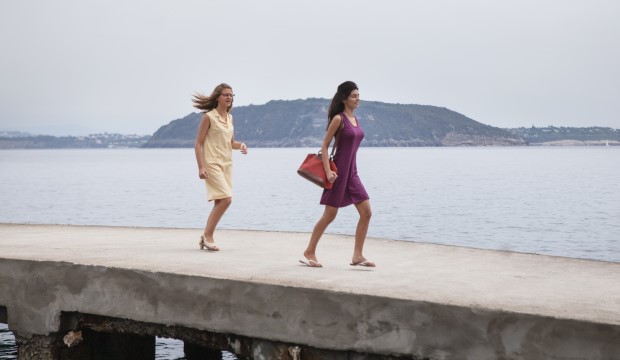
Lila (Gaia Girace) indulges her romantic fantasies with the breathlessly annoying Nino (Francesco Serpico) while ignoring the idea of confronting her abusive husband Stefano (Giovanni Amura) in Naples. The idyllic Ischian beach offers escape for her, as if Naples didn’t exist. She could swim out with Nino, hold hands, kiss and touch without any repercussions.
Elena (Margherita Mazzucco) acts a rational mediator between them, which is painful considering her enduring feelings for Nino – even trying to form her own reality from the situation. But they rarely listen to Elena’s criticisms, even when they return to Naples in episode six. When Elena tries to reason with them, Lila curtly responds: ‘I’m so happy, don’t put sad ideas into my head.’

Photo: HBO
Both
episodes juggle this difficult dichotomy, fiercely pegged to the characters’
feelings – splicing together memories with an anxious present. After Elena
witnesses something inexplicable in the back of a bar, she thinks every
customer is staring at her. Reality is skewered by her pain, predicted by the
strong titles of the episodes: The Betrayal and, simply, Rage.
Having not told Lila about her love for Nino, Elena spends episode five quietly dealing with her frustrations. But when she returns to Naples, she hardens up and pursues her independence – finding a chance to be free from Lila and Nino and her community. In one gloriously cathartic scene, she loses it and finally stands up for herself. It's a scene deserving of an applauding crowd. How long has she been biting her tongue, staring sceptically with her lips tight shut?
It’s a shame that director Alice Rohrwacher’s contribution is limited to only two episodes (four and five). She adds a psychological, near-transcendental depth that rubs against the surreal – more so than regular director Saverio Constanzo, who returns in episode six.

Photo: HBO
But Constanzo is still one of the most aesthetically
compelling directors in TV and continues to innovate in his adaptation. In an
interview with IndieWire, he talks about evolving the cinematic style in season
two: stepping away from season one’s gritty tone, inspired by 40s/50s Italian
Neo-Realism, and plunging into the wild, French New Wave experimentation of the
late 50s and 60s.
It’s a riveting change, foreshadowing the era of protest that’s approaching in the story like a twilit tsunami. Hair's changing, contraceptives are being used, more women are defying the patriarchy. The times, they are a-changing.
Both episodes scream out of their usually quiet and ponderous shells, breaking into scenes of genuine tension. Although the suspense of a dangerous affair is ubiquitous in drama, screenwriters Francesco Piccolo, Laura Paolucci, Constanzo, and the elusive Elena Ferrante herself treat it with absorbing delicacy – augmented by Rohrwacher’s beautiful close-ups, which have the intensity of a Sergio Leone Western.
No doubt this standard will continue into next week’s closing episodes, ensuring a flawless season superior to the first.
My Brilliant Friend: The Story of a New Name continues on Fridays at 9pm on Sky Atlantic
| What | My Brilliant Friend season 2 episode 5 & 6 review, Sky Atlantic |
| When |
03 Jul 20 – 03 Jul 21, ON SKY ATLANTIC |
| Price | £n/a |
| Website |





